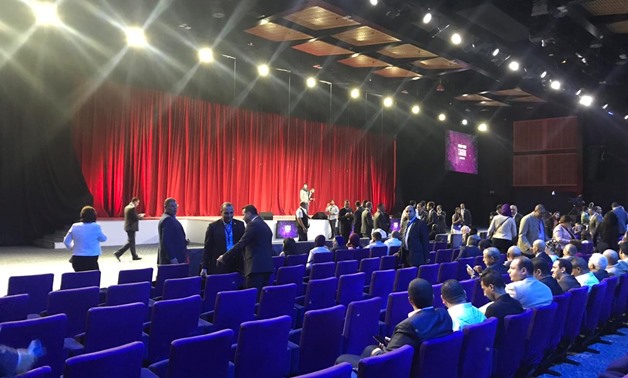
The participants of the World Youth Forum flocked on Friday evening to the theater hall to attend the new play El Za’aer (The Visitor) in addition to a number of performances and dances - Egypt Today
CAIRO – 3 November 2018: Egyptian Minister of Foreign Affairs Sameh Shoukry and Kuwaiti Minister of Information and Youth Mohammed Al-Jabri headed to Sharm El-Shiekh Saturday to participate in the World Youth Forum (WYF), where thousands of Youths and officials from around the world will exchange ideas Nov. 2-6.
Shoukry published opinion article on Friday, saying “The forum brings together future leaders and policy makers to share views, experiences and present practical recommendations in three main topics: peace, development, and creativity … Each topic is possibly a prelude to the other, while all, undoubtedly, reinforce each other.”
“Connecting our young potential lies at the heart of any future progress. This is our responsibility today. The key is to bring them together in order to leverage their immense potential for creating a future of peace and development … If a culture of empowerment and intra-communication is well instilled in the hearts and minds of our communities, youth around the globe will positively engage and collaborate, shaping the world to become a more peaceful and prosperous place,” the minister added.
“The Middle East and Africa, with Egypt at their heart, are witnessing the largest-ever growing youth population … Their voices for change, freedom and social justice were so strong that they resonated all across the world… empowering young women and men, unlocking their vast potential, has become our way forward,” Shoukry continued.
“Since youth are our partners for global change, there is full recognition that their voices have to be heard not only at our national level, but also at the regional and international levels,” he concluded.
Meanwhile, the official Kuwaiti new channels reported that Jabri is happy to attend the major event, where he will listen to opinions of many youths of different nationalities about issues of concern to the public opinion, and about means to enhance dialogue of civilizations and coexistence.
The WYF administration has received more than 35,000 applications from youth coming from 165 countries to participate in the forum so far, since it has opened registration on Aug. 18, the administration announced on Thursday. Some 30 percent of applicants come from Africa and Arab countries, while 70 percent of the applying youth are from other different countries, the statement added.
The administration opened a live chat for direct communication with the youth, who are interested in attending the forum, to help solve any technical problems that may face them during registration.
The WYF in its second annual version will tackle two main axes: peace and development.
The first axis will discuss reconstructing post-conflict countries and societies, the role of world leaders in achieving peace, the duty of the international community to provide humanitarian assistance, counter-terrorism issues, and Euro-Mediterranean Partnership.
The theme of the development will include topics related to energy and water security, empowerment of people with disabilities, the role of voluntary work in building societies, the agenda of 2063 African Sustainable Development, digital citizenship, the role of art and cinema in shaping communities, ways to build future leaders, and the means of shrinking the gender gap in the work force.
An Arab-African Summit Simulation Model will be held on the sidelines of the Forum, as was recommended during the African Union Simulation Model held in May 2018 as part of the activation of the recommendations of the 2017 World Youth Forum.
The first edition of the World Youth Forum was launched from Nov. 4-10, 2017 in Sharm el-Sheikh. It was attended by 3,200 participants from 113 countries. The forum was a platform for 222 speakers from 64 countries with expertise in various fields, gathered in 46 sessions.
In the 2017 edition, the participating leaders and experts discussed various international and regional issues, including crises of migration and refugees, democracy and human rights, African stability and development, and globalization and cultural identity, as well as the technology and social media and their impact on the population.


Comments
Leave a Comment